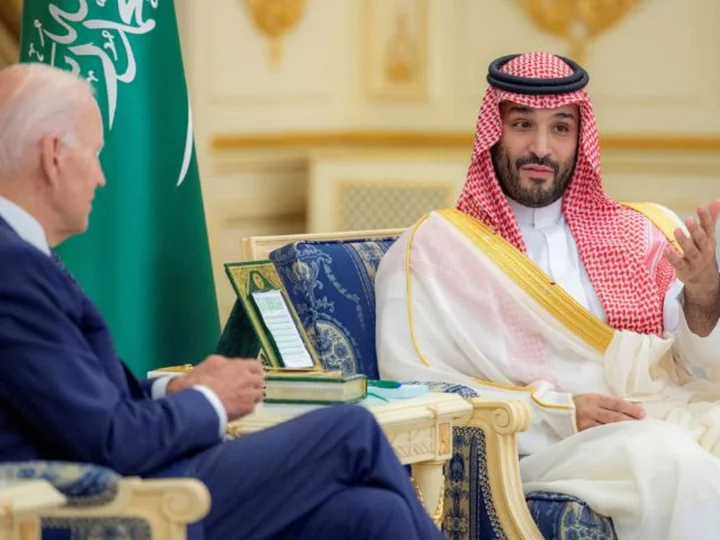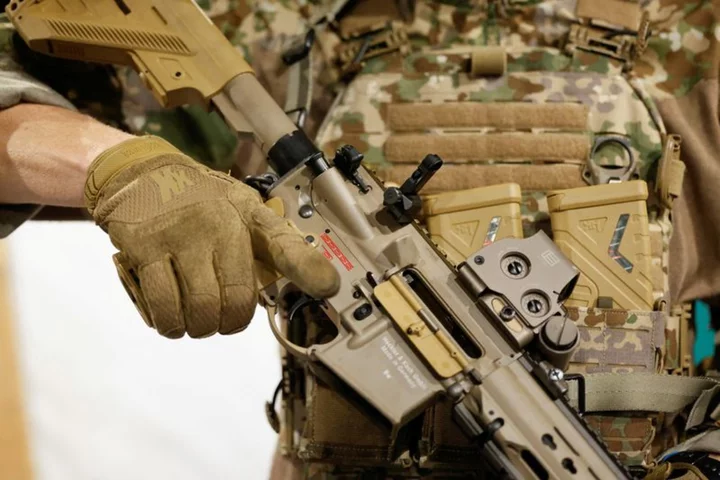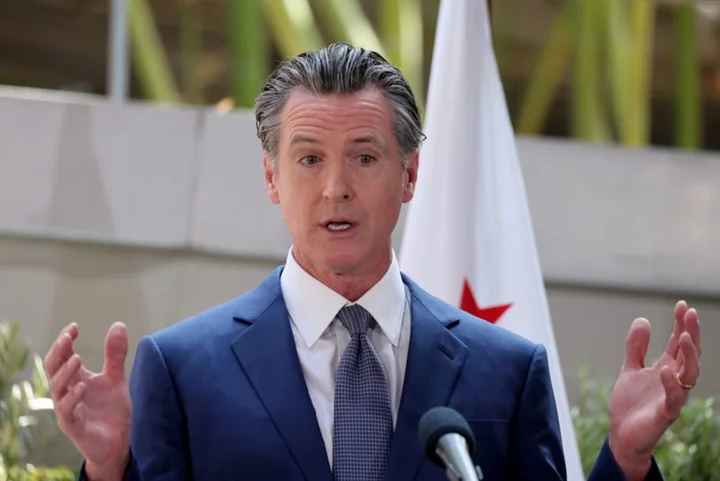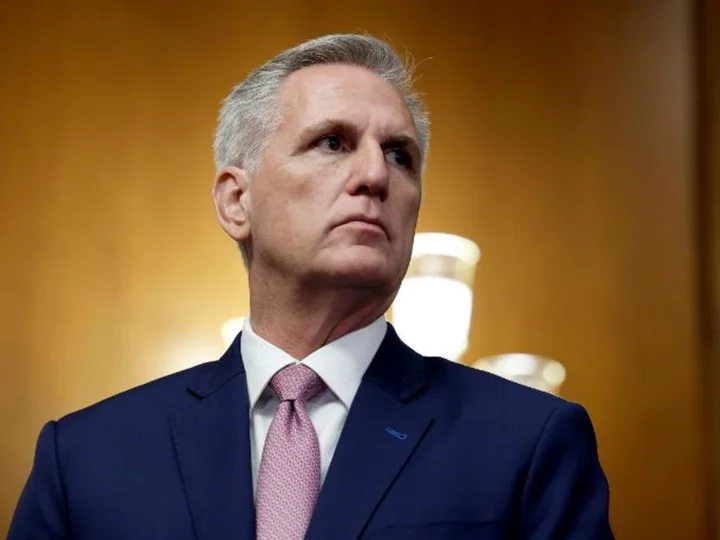Two of the United States' closest Arab allies are asking the Biden administration to formalize their military relationship with a wide-ranging agreement as Washington becomes uneasy about China's growing role in the Middle East.
Saudi Arabia and the United Arab Emirates, two of the US' closest military partners in the Arab world, have called for more security support from Washington of late, and both have indicated that in an increasingly multipolar world, their options aren't limited to the US.
"They (the Americans) don't want to see Saudi Arabia shifting their armament from America to another place," Saudi Crown Prince Mohammed bin Salman (MBS) told Fox News' Bret Baier in an interview last month.
Anwar Gargash, the UAE president's diplomatic adviser, last month described the US' involvement in the Middle East as "a positive thing," but stressed the importance of cementing that involvement so "that there are no vacuums" -- which, he warned, would only "give opportunities for other players to move into."
It is important to move from an "informal" security arrangement "to something that's formal," he said at a conference in New York, calling for a new, "ironclad" security arrangement with the US.
The demand for a formal arrangement that would offer Gulf states a security umbrella and bind the US to protecting them in the face of military attacks has become an essential component in ties with the US.
Gulf states have over the past few years faced attacks they have blamed on Iran and its proxies, and have found the US' response to them inadequate.
"Only a substantive security commitment by the United States would be perceived by regional adversaries as a deterrent to their ambitions to topple the U.S.-led regional order of which Saudi Arabia is the anchor," Ali Shihabi, a Saudi analyst, wrote in an article for the Hoover Institution, a public policy think tank at Stanford University, in July. "If the United States wants to fully leverage with Saudi Arabia its own capacity to project military power into the region, then it needs to reintroduce deterrence by making such power projection tangible and reliable."
A security pact is at the heart of Saudi Arabia's talks with Washington over potential normalization of ties with Israel -- which, if achieved, would mark a significant foreign policy win for President Joe Biden ahead of the 2024 US presidential elections.
Last month, MBS for the first time publicly acknowledged the normalization talks, saying his country was moving "closer" each day to reaching a deal with Israel.
What a security pact could look like
Experts say the Gulf states may be disappointed as the US is unlikely to extend a blanket security agreement that could get it further bogged down in the Middle East's conflicts and require a cumbersome legislative approval process in a Congress where Saudi Arabia remains unpopular due to its human rights record.
Discussions over the potential agreement have not been made public, but experts have put forward a number of ideas, from treaties that recognize Gulf security as part of US national interest, to declaring the Gulf nations Major Non-NATO Allies, to a formal security commitment from the US such as those signed with Japan and South Korea.
The US entered defense treaties with Tokyo and Seoul in the 1950s, pledging to defend the two nations in case of armed attack. Both nations have a sizable US military presence and also enjoy Major Non-NATO Ally status.
The Major Non-NATO Ally status is a US designation that provides partners with defense trade and security cooperation benefits. While it is seen as symbol of close partnership with some military and economic privileges, it doesn't entail any security commitments from the US.
Among the Gulf states, Bahrain, which hosts the US Navy's Fifth Fleet, was the first to be declared a MNNA in 2002. Qatar, which is home to the US Central Command, was added to the list last year.
Saudi Arabia and the UAE are likely asking for a comprehensive treaty, similar to that signed with Japan and South Korea, said Jean-Loup Samaan, a senior research fellow at the Middle East Institute of the National University of Singapore and author of "New Military Strategies in the Gulf: The Mirage of Autonomy in Saudi Arabia, the UAE and Qatar."
They may also be asking that Washington ease access to arms sales and potentially increase the US military presence in Saudi Arabia and the UAE, he added, potentially to match the presence in Qatar or Bahrain.
It is however unclear if the US would commit to a treaty that would require it to come to the Gulf states' defense in case of attack.
"This can only be conferred through a Senate-ratified treaty," said David Des Roches, a professor at the Near East South Asia Center for Security Studies and former Pentagon official who worked on the Middle East.
"In the absence of a true breakthrough (such as Saudi recognition of Israel), it's hard to see the Biden administration presenting any treaty, even a weaker commitment... to the Senate," Des Roches told CNN. The president can offer some concessions without Senate ratification, he said, but that won't meet Gulf states' requirements.
"The Saudis and others have seen how a non-treaty arrangement can be undone," he said, referring to the Gulf perception that the US is disengaging from the region. "(They) are unlikely to be satisfied with anything short of a binding treaty commitment."
Between oversight and autonomy
Some experts say that any agreement with the US will necessarily impact Gulf states' autonomy over their own defense affairs, as the Biden administration is likely to ask for guarantees that its Arab allies reduce engagement with rivals like China and Russia, both of whom have bolstered ties with the Gulf states of late.
The UAE in 2021 suspended a multi-billion-dollar deal to buy US-made F-35 fighter jets amid Abu Dhabi's growing frustration with Washington's attempts to limit Chinese technology sales to the Gulf state. At the time, the sale was seen as a cornerstone of the UAE's decision to normalize ties with Israel a year prior.
Asked if the UAE is still interested in procuring F-35 jets from the US, Gargash last month said it is, but stressed that there are "sovereign requirements" that need to be settled with the US.
Des Roches said that with a new security pact, the US is likely to ask the Gulf states to "curtail the fielding of any Chinese technology which has the potential to compromise US weaponry in service with Gulf countries."
But Gulf states, he said, "are likely to regard such restrictions as an infringement on their sovereignty."
Nevertheless, said Samaan, the demand for a new security arrangement with the US shows that Washington remains the Gulf states' first port of call when it comes to security matters, despite the threats about finding alternatives.
"We're back to business as usual," he said, where Gulf states are turning to Washington and asking for bigger security packages -- even if recent public rhetoric has shown some disconnect between what those states will publicly say and what they really want.









